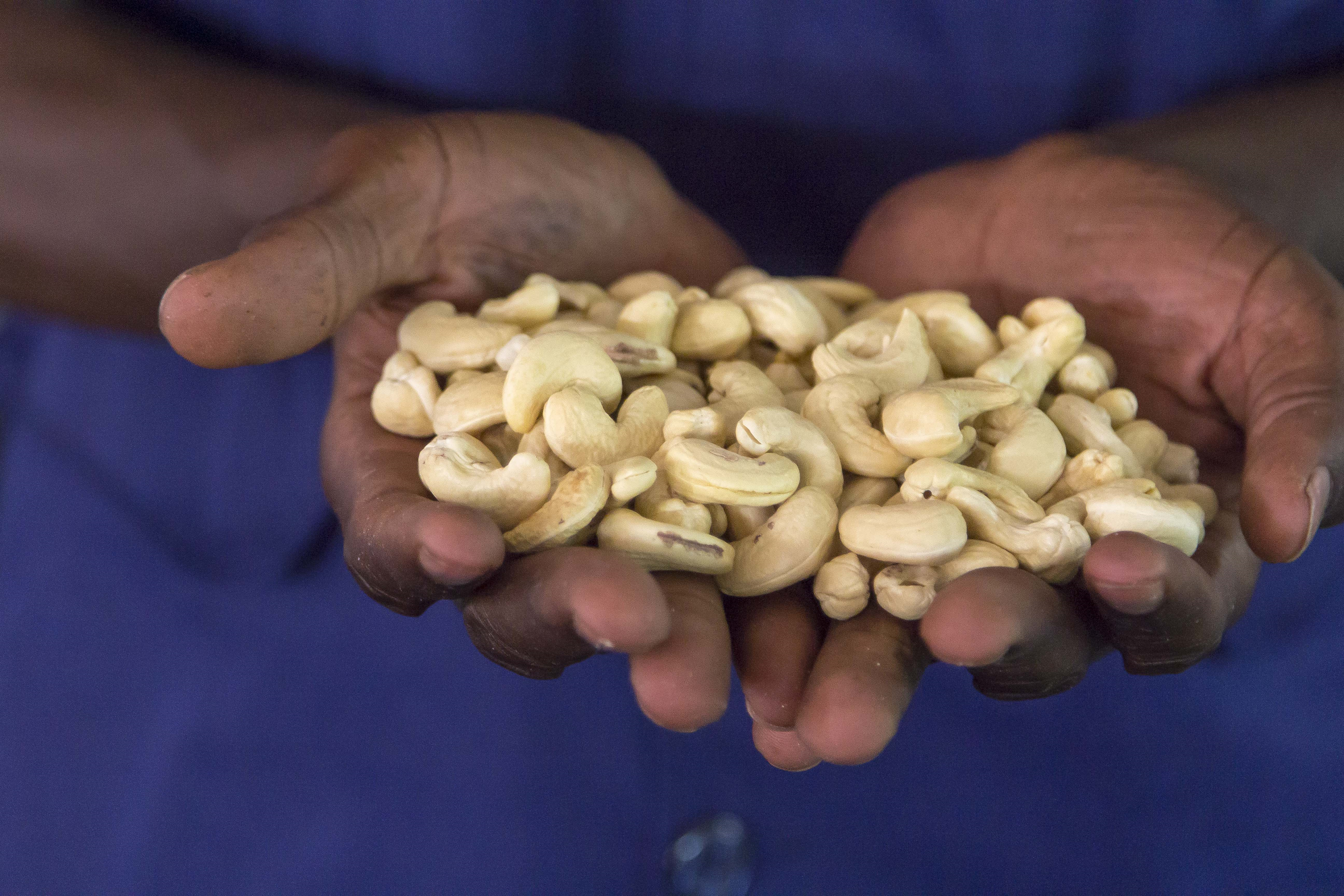Towards a traceable cashew supply chain in Côte d’Ivoire
The global cashew supply chain is complex and faces various sustainability challenges. Companies in the nuts sector are recognising that improving the cashew supply chain by for example, local processing can have positive effects on the livelihood of farmers, processers and rural communities. OFI, a leading player in the global cashew sector, invested in a local processing plant in Côte d’Ivoire and started to source directly from local farmers.

For our direct sourcing and local processing strategy we collaborated with FairMatch Support. FairMatch Support made it clear that if we want to succeed for the long-term we need to focus on a viable business case for both OFI, as for the smallholder producers.
Mallikarjuna Kumaraswamy
For this strategy OFI collaborated with FairMatch Support. Together we have succeeded in shortening the supply chain by buying directly from farmers on a scale that has not been seen before. We talked to Mallikarjuna Kumaraswamy, Head of Operational Excellence for Edible Nuts at OFI, about their experiences.
The cashew supply chain
In Africa, millions of smallholder cashew farmers are selling Raw Cashew Nuts (RCN) via a complex network of local traders who often take advantage of the farmers’ lack of access to reliable information such as farmgate prices and understanding of market dynamics. As such, farmers receive low prices for their crops and have little incentive to reinvest in their farms.
Mallikarjuna Kumaraswamy:“ If you look at the cashew supply chain here in Côte d’Ivoire years ago, no one was able to tell where the cashew was coming from and what the issues were in the supply chain. There is an amount of anonymous trade and mixing of origins during transport and processing. However, there is now an increasing consumer demand for sustainability and traceability. In particular, the demand for cashews has grown in line with the rising consumption of vegan products and healthy on-the-go concepts. We see it as our responsibility to bring awareness to our customers about where these products are coming from.”
The importance of local processing
Despite being one of the largest producers of cashews globally, most of Africa’s cashews are exported raw to countries such as Vietnam and India, which are ahead in terms of mechanised processing capabilities. It is often cheaper to export RCN to these countries for processing than to do so in Africa, resulting in the likes of Côte d’Ivoire losing out on the potential added value.
Mallikarjuna Kumaraswamy: “We need to invest in our processing facilities to keep additional value in the country. At OFI, we’re on a journey to establish a truly traceable cashew supply chain and have invested more into local processing. This included opening a new processing plant in Bouaké where we process both organic and standard cashews. The modern facility has a capacity of 35,000 Mt of Raw Cashew Nuts (RCN). Although modern machinery was installed to mechanise operations, the processing plant has created more than 2,000 direct jobs and catalysed more employment opportunities indirectly for the city.”
Shortening the chain is an essential step in sustainable collaboration
In order to secure a consistent supply of cashews to its Bouaké plant while positively impacting rural communities, OFI wanted to source more directly from local farmers. Mallikarjuna Kumaraswamy: “Direct sourcing sounds straightforward but is highly complex. Not only was the cashew supply dominated by middlemen who had little intention to inform and empower the farmers, but farmers were even abandoning their cashew farms due to low prices and market volatility”.
Building a professional business relation is key
For their sourcing strategy OFI collaborated with FairMatch Support. Herman, director FairMatch Support: “A different way of organising the supply chain is required to facilitate the supply of RCN to the processing plants and mitigate the sustainability issues in the supply chain along the way. However, for buying companies this is a enormous change and a different way of thinking of buying and relationship management. But shortening the chain is an essential step for a transition to a sustainable sector and sustainable collaboration”.
Mallikarjuna Kumaraswamy: “FairMatch Support has expertise in the development of sustainable supply chains. As OFI we need partners who bring knowledge and experience on how to work on linkaging farmers and cooperatives to our processing facility. The professionals of FairMatch Support coached us on the implementation of our strategy. FairMatch Support made it clear that if we want to succeed for the long-term we needed to focus on a viable business case for both OFI, as for the smallholder producers. Establishing a relationship and becoming professional business partners was one of the most important steps in our new local buying structure.”.
This was not done overnight. Together with the staff of FairMatch Support West Africa OFI went to the various villages surrounding Bouaké to inform the farmers about their plans to buy directly from them and to support them in the creation of farmer groups. As many had long-term relationships with the middlemen and obtained certain services such as access to credit, it took time and effort to convince the farmers to join. OFI invited farmers to the Bouaké processing plant to show them that the company was serious. It was only when the farmers started to interact with OFI staff year-round, including outside of the procurement season, that they became enthusiastic to join.
Herman, director FairMatch Support: “A sustainable supply chain with success for the long-term requires collaboration along the whole (end-to-end) chain. We worked with OFI on building professional business relationships with their suppliers. Align different interests and create common language and understanding is key for sustainable development.
Sustainable Cashew Growers Programme
The farmers who decided to join this direct sourcing relationship became part of the Sustainable Cashew Growers Programme (SCGP). The main idea behind this programme is to allow farmers to be confident and enthusiastic in committing to working directly with OFI in the mid to long term and seek to continually improve their farming practices to be more sustainable.
Working on innovation through data analysis
Sourcing directly from the farmers and processing the cashews in the country of origin are crucial conditions for establishing traceability and transparency. The next step is data collection, data assessment and management of this data.
Herman, director FairMatch Support: “More transparency and traceability gives the opportunity to increase production and quality of the cashews. Together with OFI, Intersnack, TDG (now Nuts2) and Albert Heijn we developed a Management Information System (MIS) in which farmer groups and processors can collect data on the quality and quantity of the nut production. Subsequently, improvements can be made due to this data collection".
Jointly with FairMatch Support, OFI classified the farmer groups in one of three categories depending on the professionality of the organisation. Clear criteria for moving from one category to another were created and a clear award package for each of the classifications was set up. Rather than only focusing on cashew volume, farmer groups were also rewarded for their cashew quality and for the way the group was working together with OFI.
Mallikarjuna Kumaraswamy: “At OFI we were already collecting data but not yet on this scale. Due to the MIS we received information about cashew volumes and best performing farmer groups or regions. This enables the segmentation of farmers and the opportunity to develop tailor-made training programs on better production and quality improvement. We notice improvements in terms of quality and volume. We learn from past experiences, we can identify factors and adjust accordingly. This provides more income for the farmer and lower costs for us because it helps to optimise logistics, for example.
Collaboration
"Thanks to the collaboration with FairMatch Support and Olam I started to see cashew as an opportunity. The administration part was new to me, but by registering the volumes it helped me to see the farm more like a business. In the village, we are now much better organised. We have a warehouse for example. As the youth representative of our village, I make sure the future of young people in the village is taken into account in the decisions we take".
Farmer from the SCGP operations OFI
Projects
They are willing to make a true difference in sustainable business
We work worldwide with a variety of agricultural products. Our programs are always conducted in cooperation with our global network of like minded local business development organisations.


